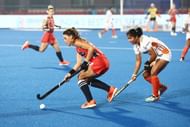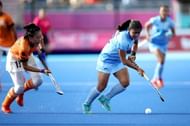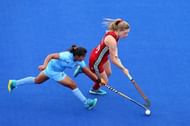When one thinks of sportspersons of Haryana, one immediately associates them with Jats. This community has produced many of India’s leading sports stars, not least in women’s hockey. Names such as Punia and Malik are very common.
But now, a new type of name has emerged from the state in the Indian women’s hockey team – Goyal. 23-year old midfielder Neha Goyal has been one of Indian women’s hockey team’s most important players. Her work in the midfield has played a key part in Indian team’s good performances over the last year.
Not a Jat but coming from the Baniya community, Neha is breaking stereotypes and showing that hard work and talent is not limited by social boundaries. But she has done something even more admirable. Coming from an extremely poor family plagued by internal problems, she moved ahead with determination and the unwavering support of her mother to realise her dreams.

In an exclusive interview, Neha talks about playing in India for the first time during the Olympic qualifiers as well as her tough personal journey. Her story is one that should impress every Indian.
You played your first home match in the Olympic qualifiers against USA at the Kalinga Stadium. How was that experience, especially playing in front of a large crowd?
Before this event, we had played in the World Cup against England in England. There was a large crowd there as well. But against USA, we were clear that we shouldn’t let ourselves get pressurized by the presence of a large crowd.
Our aim was to give our best. Also, not look at the crowd because sometimes, when we do that, our game goes down as we start feeling the desperation to not make any mistakes.
As far as the experience is concerned, I was playing in India for the first time. The people of Odisha greatly motivated us and cheered us up. This gave us confidence.
The first match was won easily in the qualifiers but the first half of the second match saw many basic errors being made. What was the reason for that – too much pressure or underestimating the opposition?
No, I wouldn’t say there was excess pressure or that we underestimated the opposition. Team USA knew that if they lost, their chance would be gone. So, they were playing up to their 100% potential. Our team was also trying but as soon as we conceded a goal, that too because of our own mistake and not due to any great work on their part, the team felt a little down. Then, we kept conceding goals due to our own mistakes and felt even more dejected.

At half-time when we went inside, our coach told us that still, effectively, the score is 0-0 in terms of aggregate, and we haven’t lost anything. We can still win. The match is still within our reach. So, the coach motivated the girls, which gave us confidence. As a result, second half was much better.
As soon as captain Rani scored the goal in the second half, suddenly your team started playing much better and had the upper hand. So, is it the mental aspect of the game that is more important than physical?
Often, what happens is that we look at each other’s body language and react to it. So, if one of our teammates has a very positive body language, our body language is also positive. What happened in the first half was that when one player made a mistake, others were also feeling the pressure to not make mistakes.
But in third and fourth quarter, there was a realisation that there is no tomorrow. I myself felt that if I don’t perform today, then, who knows what will be the scene when the 2022 Asian Games come around. I might get injured or whatever. So, whatever has to be done, has to be done today.
If I improve my body language, by looking at me, my teammates will also do better. So, by looking at each other, we improved our body language and then we played aggressively. When we got a goal, more confidence came into our team.

Is it also important to keep yourself calm and stay relaxed, not let too much pressure come onto yourself?
Very often, when we are under pressure, we think that we have to do everything ourselves, like scoring goals. But at such moments, we should keep it in our minds that if we do our job, other players in the team will do theirs also.
Now, coming to yourself, tell us about your journey. How and when did your involvement with hockey began?
I am a Goyal and, in my family, nobody played hockey. My friends used to play hockey in school. When I was in 5th standard, one of my friends said, “Come with me.” Also, I had seen reports about Indian hockey team in newspaper. So, I thought, “Why not?”
I am from a very poor family, though things are fine now as I have a job and I can take care of my family. At that time, having seen young kids playing in the ground, I got interested. After that, I kept visiting the ground regularly.
When you started playing, did you feel that you were naturally talented? Or did you have to rely on hard work to make yourself a hockey player?
I did have to do hard work but there was also natural talent in me as far as the skills were concerned. As far as the hard work that I had to put in, when I went to school, I used to take an extra pair of clothes with me. I would change into them and go to the ground. We would go to the ground one hour before the practice began and trained on our own so that we could pick up some extra skills.
Most of the players from Haryana are Jats. You are not a Jat and Goyal is a surname that one doesn’t see often in hockey. So, how did your family react when you took up this sport?
I am from the Baniya caste. As I told you that I am from a very poor family. My father, who passed away two years ago, used to drink a lot at that time. He had no scope of working. So, my mother used to work in many houses and factories. My mother never stopped me from playing hockey. She told me, “Go ahead and play, I am with you.” She supported me a lot.
For instance, our home was about 7-8 kilometers away from the ground having astro-turf where we had to go for training. It would cost Rs 20 to go there by auto rickshaw. If I had to go there daily, it was difficult for me to afford it at that time. Still, my mother provided me the money. I faced a lot of financial difficulties and it was very difficult.
You said that you started playing after watching one of your friends in school. How did you get to the next level?
After school, I got selected at the state level. After that, I played in the nationals.
So, when did you start receiving help of the authorities and getting the necessary equipment from them?
In 2011, I played in my first Senior National Championships representing Haryana. I won the Young Player of the Tournament award in that event. I got Rs 21,000 as the prize money. It was from that tournament that I got selected for the Indian national team’s coaching camp.
Many youngsters coming through get admitted into hostels for players. Did you, at any stage, live in a hostel?
No, I didn’t live in a hostel but my house wasn’t far away from a ground. I used to practice in that grass field ground. It used to take 15 minutes to get there.
At what stage did you feel that you can play for India?
I used to get inspired by my coach, Pritam Singh, an Arjuna awardee and a former captain of the Indian women’s team. I used to think that I should become a player like her, play like she did and make it to the Indian team. By looking at her, I decided that I will also play for India and I have to become a player like her.
When did you come into contact with her?
I was with her right from the beginning when she was coaching at the government school in Sonipat where I was.
Lastly, there are a few months remaining for the Olympics. How excited are you with the prospect of playing in it?
I am very excited because it will be my first Olympic Games. I have worked very hard to get here. Our team has also worked hard for it. We have also improved a lot as a side in the last two years. Right now, our team is good enough to defeat any side, no matter which one is up against us.
It wasn’t like this earlier. We used to be a little fearful. But now, we are playing freely. Our coach is also trying to turn is into a fearless side. If we make any mistakes, he says, don’t let it get you down. We have to play freely and not be afraid, doesn’t matter which team is against us, be it Netherlands or any other side.
